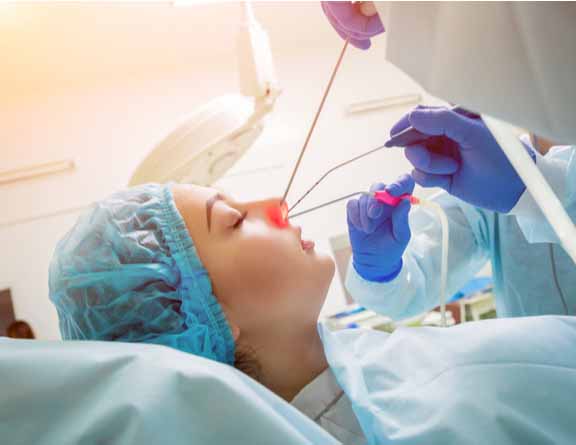
Jammu
FESS, or Functional Endoscopic Sinus Surgery, is a minimally invasive surgery in which the surgeon uses nasal endoscopes to increase the size of the nasal drainage pathways of the paranasal sinuses to improve sinus ventilation. It is the most effective treatment for sinusitis.
Sinusitis is the inflammation of the tissue lining of the sinuses. Healthy sinuses are pneumatic, i.e., they are filled with air and responsible for humidifying and warming the inspired air. On the other hand, if sinuses are infected, they are filled with mucus and bacteria, which causes nasal congestion, inflammation, etc., which makes breathing difficult.
When sinuses are too congested and are not responding to medicines, then surgical intervention becomes necessary to drain the sinuses and make breathing easier. If you have severe sinusitis and want to get long-term relief from your symptoms, book an appointment with the best ENT specialists in Jammu for sinusitis treatment near you.
USFDA-Approved Procedure
Support in Insurance Claim
No-Cost EMI
Same-day discharge
Pristyncare%20Clinic.webp)


Diagnostic procedures required for sinusitis treatment
One of the most important criteria for diagnosing sinusitis is a medical history and physical examination. Your doctor will collect a detailed medical history, along with your symptoms, their severity, duration, recurrence, etc., to determine whether you have acute or chronic sinusitis.
Other diagnostic tests that help diagnose the presence and severity of sinusitis are:
Treatments for chronic sinusitis in Jammu
In contrast to conventional surgery, FESS is less invasive and promises better recovery with minimal scarring. It is usually performed under local anesthesia. The surgical instruments are inserted through the nose to preserve aesthetic appearance. The infected sinuses are located, drained and then washed using a saline solution. After all the infected tissue is removed, the incisions are closed.
If you are suffering from either acute or chronic sinusitis, you should consult the best ENT specialist near you for appropriate treatment. Pristyn Care is aligned with the best ENT doctors in Jammu to provide the best treatment to all patients.
Best ENT Clinics For Functional Endoscopic Sinus Surgery
At Pristyn Care, you can avail advanced sinus surgery with a microdebrider for better results and quicker recovery with low chances of recurrence.
At Pristyn Care, we have ENT surgeons with 8-10 years of experience in performing advanced FESS surgery with successful results.
FESS surgery at Pristyn Care has a success rate of over 95%, thanks to our advanced treatment facilities, expert surgeons, and state-of-the-art treatment centers.
At Pristyn Care, you can avail pre and postoperative consultations along with diagnostic endoscopy for diagnostic confirmation and treatment planning. You will also receive follow-up checkups with your ENT surgeon after surgery.
You should consult an ENT specialist for sinus surgery if you have chronic sinusitis and you are getting adequate relief from conservative treatments.
Yes, most major insurance companies cover sinus surgery so it is very likely that your surgery will be covered by insurance but you should confirm this with your insurance provider if you are unsure about your policy terms.
If not performed properly, FESS can cause further complications such as failure to resolve sinus issues, hemorrhage, chronic nasal drainage, pain, empty nose syndrome, CSF leakage, etc.
It is called functional as the main goal of the surgery is to restore sinus ventilation and normal function of the sinuses.
If you delay sinus surgery, sinus infections can spread to nearby organs and cause severe eye, ear or brain infections. Sinusitis can also reduce or distort the sense of smell over a long period of time.
10 tips you can follow to avoid the recurrence of sinus infections are:
If left untreated, chronic sinusitis can cause serious complications.
.svg)
.svg)